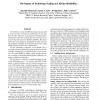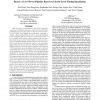419 search results - page 3 / 84 » Impact of Technology Scaling in the Clock System Power |
INTEGRATION
2008
13 years 9 months ago
2008
Thermal gradients across the die are becoming increasingly prominent as we scale further down into the sub-nanometer regime. While temperature was never a primary concern, its non...
DSN
2004
IEEE
14 years 1 months ago
2004
IEEE
The relentless scaling of CMOS technology has provided a steady increase in processor performance for the past three decades. However, increased power densities (hence temperature...
MICRO
2003
IEEE
14 years 3 months ago
2003
IEEE
With increasing clock frequencies and silicon integration, power aware computing has become a critical concern in the design of embedded processors and systems-on-chip. One of the...
ICCD
2002
IEEE
14 years 6 months ago
2002
IEEE
Power is considered to be the major limiter to the design of more faster and complex processors in the near future. In order to address this challenge, a combination of process, c...
TPDS
2010
13 years 8 months ago
2010
This paper studies the problem of realizing a common software clock among a large set of nodes without an external time reference (i.e., internal clock synchronization), any centr...


